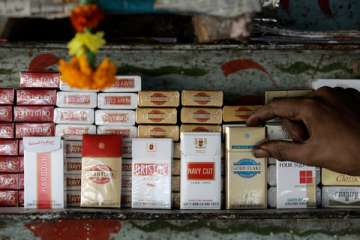New Delhi: The Indian tobacco industry today announced that it will stop the production of all its products with immediate effect citing ambiguity over Centre’s direction to carry pictorial warnings on the packets of all tobacco products.
"Manufacturers of cigarettes, beedis and smokeless tobacco products in India have decided to stop production from April 1, 2016, citing ambiguity in the policy related to Graphic Health Warnings on tobacco products," said a statement from the Tobacco Institute of India (TII) which represents the tobacco and cigarette industry.
The decision comes close after the government's announcement on Friday enforcing 85 per cent pictorial warnings on the display area of packets of all tobacco products.
The Tobacco Institute of India (TII) comprises manufacturers who account for more than 98 percent of the country’s domestic sales of duty paid cigarettes in India.
“The Indian tobacco industry had written to Ministry of Health & Family Welfare on March 15, 2016, seeking clarification on the matter,” said Syed Mahmood Ahmad, director, Tobacco Institute of India.
The TII said if it stops production, it will lead to an estimated loss of Rs.350 crore per day in production turnover for the Indian tobacco industry.
The tobacco producers are against the 85 percent pictorial warning which, they said, could lead to flooding of foreign cigarettes in the market.
A parliamentary committee had also recently advocated pictorial warnings on tobacco and cigarette packets to be brought down to 50 percent from 85 percent, saying that the latter figure will be too harsh on the tobacco industry.
Among the issues that have been raised by the manufacturers are that the extreme 85 percent warnings will promote illegal cigarette trade and adversely affect the livelihood of 45.7 million people dependent on the tobacco industry which included farmers, labourers, workers, trade and others.
"Illegal cigarettes account for one-fifth of the total cigarette industry resulting in annual revenue loss of Rs. 9,000 crore to the national exchequer. Tobacco control policies appear to be directed by NGOs and anti-tobacco activists who are funded by overseas vested interests," said the statement.
(With IANS inputs)
Latest Business News
